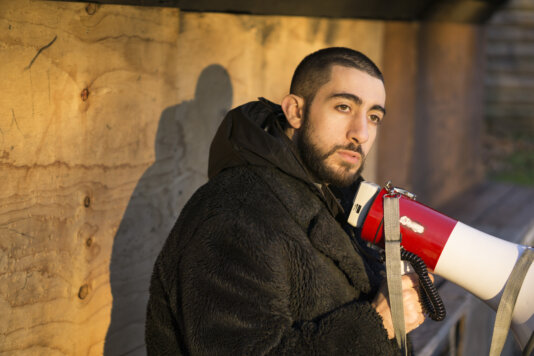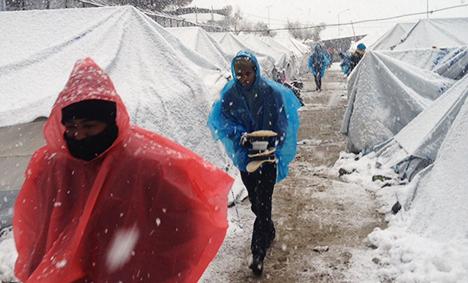- About
- Topics
- Picks
- Audio
- Story
- In-Depth
- Opinion
- News
- Donate
- Signup for our newsletterOur Editors' Best Picks.Send
Read, Debate: Engage.
| November 24, 2020 | |
|---|---|
| topic: | Refugees and Asylum |
| tags: | #Abdulfatah Hamdallah, #Potent Whisper, #freedom of movement, #asylum seekers, #human rights |
| located: | United Kingdom, South Sudan, France |
| by: | Anu Shukla |
Meanwhile, news reports of the tragedy triggered a nauseous wave of anti-immigrant attitudes. It’s no small feat to confront such behaviour engrained by the mechanics of a system that seems to dehumanise by default, the world’s most marginalised people.
British spoken word artist Georgie Stephanou — best known as Potent Whisper — has seemingly smashed that challenge with his latest project, Lucid Lovers: a metaphysical romance about a couple who discover the art of lucid dreaming to transcend borders and reunite in the non-physical realm after they are torn apart by
Sudanese state-violence and systemic obstacles to asylum in the UK.
According to lucid dreaming expert Charlie Morley: “A lucid dream is a dream in which you know you are dreaming as you are dreaming.” It is also, he said, “a mind training method” verified by Tibetan Buddhism over a thousand years. And with this as its theme, Lucid Lovers is as eloquent in its prose as it is powerful in its confrontation of the demonisation faced by asylum seekers everywhere.
The project even led the artist to deliver lessons in lucid dreaming to the homeless, and more recently, to a group of unaccompanied minors from across the Middle East.
According to Potent, it’s a universal passport to freedom of movement for the world’s most oppressed: “The idea is to show there are other ways of moving, other ways we can experience the same benefits of spatial freedom in a society restricting our movements, whether we are homeless, disabled, refugees or asylum seekers.”
Potent encountered lucid dreaming for the first time after losing his grandmother last year. He said this inspired him to pen the Rhyming Guide to Lucid Dreaming, which ultimately led to the production of Lucid Lovers.
By reciting the lessons that make up the verses of the prose, he said he uses the ‘guide’ to describe the different stages of sleep. Asking the listener to “grab a piece of paper,” he rhymes:
The first thing you can do is start to document the dreams you have — keep a pad beside your bed and every morning reach for that — and write whatever you remember, then in time you’ll read them back. And notice patterns in your dreams, and it’s the patterns we can hack!
Potent said being conscious of existing without our bodies in our dreams “seems to indicate we can exist without our bodies after we die.” He said Lucid Lovers is not only aimed at people who feel entrapped, and disempowered — but also at those who have been “brainwashed” into ‘othering’ migrants by politicians and the media. He added: “Covid has taught us what it means to lose our freedom of movement, so it's a powerful moment to emphasise how such a reality is a permanent fixture in the lives of marginalised people such as asylum seekers and refugees.”
The artist said Lucid Lovers came to life after friends inspired him to write a spoken word narrative about the Sudanese Uprising, which he named “The Rhyming guide to the Sudanese Uprising”.
Mustafa Khogali, an actor and activist who was at the forefront of the uprising, and an old friend of Potent, plays the UK asylum seeking male lead in Lucid Lovers. Mustafa, who now lives in Manchester, told FairPlanet he could see the parallels between the character and his own personal experience of finding solace in the UK. He said: “It all started in 2011, and it was mostly due to my work with youth and activism. I had been arrested a few times, wrongfully detained and tortured on several occasions. But I continued to do my work. Eventually, they out put an order to take me out, to kill me basically, and then there was an attempt on my life in May 2018, just before I came to the UK.”
Mustafa said he has spent many years travelling between Sudan and the UK with his British-born Sudanese wife and their children, though much of their time was spent living in Sudan. He said while he was “lucky” to have a multiple-entry visa to the UK — his hopes of applying for a family visa to stay in the country because of the threat to his life — went out the window.
“I thought I could adjust my visa status considering my wife and children are British, but I got told ‘no,’ and that to apply for the family visa, I had to go back to Sudan. I explained to the UK immigration officials that I would not be able to go back to Sudan, because if I did, I would not be able to come back here. So they said the only option I had, was to apply for asylum, which then became my only choice at the time.”
Mustafa said he waited 16 months before he was eventually given leave to remain in September 2019. “During that time, there’s no communication with them [Home Office officials]. They don’t give you any information about your case, and if you try to ask for it, they tell you to wait patiently.” He said this made the year "unbearably difficult” and he found himself spiralling into a state of despondency.
Mustafa, who is more accustomed to being on the frontlines leading powerful young voices to protest against oppression, said he had no choice but to watch from the sidelines as Sudan’s uprising took shape. He said: “it was a very, very difficult year for me. People were being killed, people were being detained, it was really traumatic for me not to be there, to not be besides my people at their most time of need. It definitely sent me into some sort of depression. All I could do was watch people die from a distance and not be able to do anything about it.”
According to the Refugee Council, the number of people waiting more than six months for their asylum claims, jumped by a staggering 68 percent. UK Government figures show 51,905 people were still waiting for the outcome of their asylum claims by end of March 2020.
Asylum seekers in the UK are given a daily support allowance of just £5.37 a day. Iranian filmmaker, Usef, is just about surviving on that and is still waiting for a decision on his asylum eight years later. The multimedia artist told FairPlanet he has endured homelessness, personal tragedy and illness in this period. But he has documented his journey over the years and has ambitions for it to be broadcast by media organisations such as Al Jazeera, The Reuters Foundation or the BBC.
He told FairPlanet: “I am a qualified interpreter with a diploma in photography and I am not allowed to work. Things got worse recently when asylum seeker were denied recourse to public funds, which means, we are not entitled to any public funding support, or any freedom to work and support ourselves.”
Usef’s current no-leave-to-remain visa status means he must apply to stay in the UK every six months: an obstacle that prevents him applying for long-term rental accommodation or work contracts.
He told FairPlanet that despite the fact he has been in the UK for eight years, his solicitor has told him the Home Office “believe I might have done something wrong and want to put me under pressure to leave the country.” He added: “Some people cannot survive all this. They turn to drugs and alcohol. But after two suicide attempts, I realise my film can give hope to others like me. This project has given me the incentive to be strong and carry on. We have to show each other how to stand together and support each other.”
Lucid Lovers pretty much draws on the darkness of such scenarios that affect millions of asylum seekers across the world. And with its sharp prose, has managed to unveil the frustrating reality of immigration systems and their impairment by institutionalised officials. But does it have the propensity to melt even the most hardened of anti-immigrant sentiments?
Mustafa is realistic but hopeful about the possibilities: “art is a powerful tool for manifesting positive social change. Even if Lucid Lovers doesn’t change what people think about refugees and asylum seekers, yet still causes them to just question, then I think it’s successful.”
A Home Office spokesperson told FairPlanet: “We are determined to fix our broken asylum system, making it firmer and fairer. We will seek to stop abuse of the system, while ensuring it provides safety to those fleeing persecution, oppression or tyranny, and is compassionate towards those who need our help.”
By copying the embed code below, you agree to adhere to our republishing guidelines.


